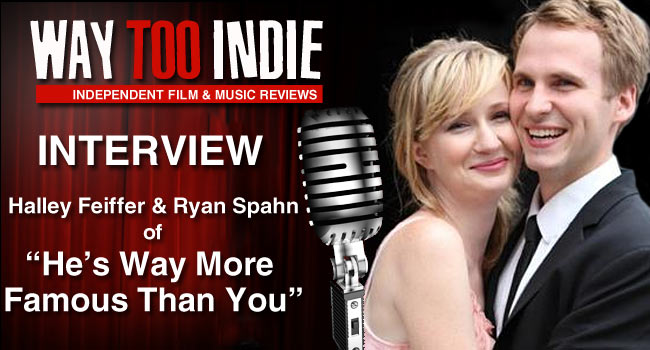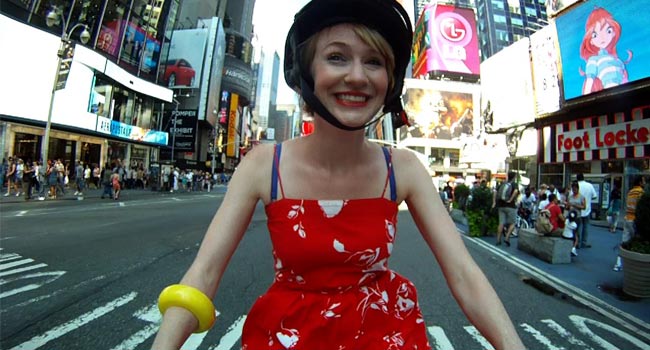Interview: Halley Feiffer and Ryan Spahn of He’s Way More Famous than You

Michael Urie directs Halley Feiffer who plays Halley Feiffer being directed by Michael Urie in He’s Way More Famous than You, a movie about making a movie. Six years after her costarring role in “Noah Baumbach’s cinematic masterpiece” The Squid and the Whale, Feiffer, now a boozy mess, tries to kick her failed-to-launch career in the butt by getting her similarly un-famous brother, Ryan (Spahn, also playing himself) to convince his famous boyfriend, Urie (the gay guy from Ugly Betty), to direct a script she’s written.
Feiffer and Spahn sat down with us prior to the film’s screening in San Francisco at Frameline37 (one day after the Supreme Court’s dismissal of Prop 8) to chat with us about the film’s uncommon tone, Curb Your Enthusiasm, a deleted sex scene involving a red swan outfit, courting Mamie Gummer, and more.
You’ve been traveling around with the movie for a while now, but is there something special about being a part of Frameline37 at such a pivotal time in LGBT rights history?
Ryan Spahn: It’s pretty exciting. Our movie doesn’t necessarily deal with any of that (laughs), but we have gay people in it. My real life boyfriend is Michael Urie, who also plays my boyfriend in the movie. The characters never discuss marriage, but…
I think movies that don’t highlight the fact that their characters are gay, movies in which the characters aren’t defined by their sexuality, help LGBT visibility more.
Halley Feiffer: We were talking about Michael last night. He shot a gay caper movie with Randy Harrison called Such Good People.
Ryan Spahn: He said that it was a movie written for anybody, and at the end [of the writing process] they said, “Let’s make them two boys.”
Halley Feiffer: It’s never commented upon. It’s never, “…and the twist is…THEY’RE GAY!” It’s just, “Here’s a couple, things happen to them.” I love that, and we try to do that in our movie, too. If anyone ever comments on the fact that the characters are gay, it’s usually my character because she’s so drunk and insane.
I have trouble conveying exactly what the film feels like to people. It has a unique comedic tone with some meta elements thrown in. Did you have trouble pitching it?
Ryan Spahn: We had the luxury of writing it while working with the person who wanted to direct it (Urie), so he was very involved in the evolution of the script. We never had to pitch it to him. The guy who ended up helping us find the financing got it immediately, so he was left to figure out how to pitch it.
Halley Feiffer: We wrote the script on spec. Both of us are actors…
Ryan Spahn: You said that whispering! You just got embarrassed!
Halley Feiffer: I did! That says a lot. (laughs) I said it like we were prostitutes or something. We both weren’t working at the time, and Ryan kept encouraging me to write something with him. I was resisting because I’d never worked with a writing partner, but he kept encouraging me. I thought, “I’m not doing anything else right now…” so we wrote it on spec. We didn’t have to pitch it to anyone. I think it is a hard pitch. I think you have to read the script to understand what the tone is.
It’s clear from the movie that you guys were having a lot of fun writing it. Where did the idea come from?
Ryan Spahn: We realized from hanging out that we had a very similar sense of humor.
Halley Feiffer: Ryan had more experience with screenwriting and I had more experience with playwriting, so we were able to bring our separate skills to the table. I had the idea for it years ago. I wrote a little treatment that I sent out to people, and everyone who read it said, “I don’t understand it. This isn’t funny. It’s sad, because it sounds like your actual life.” I sent it to Ryan about a year later, and he really liked it. He was the only person who thought it was really funny and not depressing!
How much room did you give yourselves in the script for improvisation, if any?
Ryan Spahn: We pretty much stuck to what we wrote. Our writing style is pretty improvisational in its essence, so we found ourselves improvising while in front of the computer, and then writing that down. Then, we’d really craft how we wanted it to come out of the characters’ mouths. There’s a strange way people speak sometimes—very long, convoluted, complicated thoughts. We really wanted that style.
Halley Feiffer: A lot of people ask us that question, which makes me assume that people think a lot of it is improvised. The only scene that had a fair amount of improvisation was the one with Ben Stiller. I’m pretty neurotic [when I’m writing.] Should that be a semicolon or a colon? Should that be a dash? Should we move that word over here? When you put that much thought and energy into a script, you want to keep it that way. The dialog is really stylized, too.
Halley, you go absolutely haywire in the film. Completely nuts, borderline offensive. Were there certain scenes where you went so far that you had to cut them?
Halley Feiffer: (laughs) Yes! We had a scene in the movie within the movie at the end. The joke is supposed to be that we’re brother and sister, and…oh god! I can’t believe we shot that! (laughs)
Ryan Spahn: She’s dressed head to toe in a black swan outfit…
Halley Feiffer: But it was red for some reason! I didn’t really understand why I was red, but…
Ryan Spahn: I was violently taking her from behind while I was saying, “Attack it! Attack it!” (laughs)
Halley Feiffer: That was so fucked up! We were shooting in my parents’ apartment, in my sister’s childhood bedroom.
Ryan Spahn: 90 percent of the crew, at that point, didn’t know that we weren’t siblings! (laughs)
Halley Feiffer: It didn’t make it into the film.

I shouldn’t have done this, but I read some reviews of the movie. Some critics that didn’t like the movie and seemed to completely miss the tone. Why do you think that is?
Ryan Spahn: I think there are people who find jokes about alcoholism highly offensive. They also find anything that’s “meta” cheap or annoying. Certain highly educated people sometimes don’t buy into humor like this.
Halley Feiffer: I went to Wesleyan, so be careful! (laughs)
Ryan Spahn: I go to school with kids who went to Yale or Harvard. Some who are snootily educated have trouble accepting humor like this.
It’s funny, because the film isn’t unintelligent. It’s clever.
Ryan Spahn: For them, it’s like accepting that [the movie is] clever when it has this base R-rated comedy humor mixed in with clever wordplay…it’s like they just can’t buy into it.
Halley Feiffer: It follows a lot of the rules of good screenwriting. We really adhere to structure and are rigorous about telling the story in a conventional way, but what’s unconventional is that my character is a horrible, horrible person, but she’s the protagonist. She’s in every single scene, being disgusting. I think if you’re not onboard with that, then you will hate the movie. If you can find some empathy in her and see her as not an evil person but as a sick person who needs help and eventually gets it, you can find it funny. I love Seinfeld and Curb Your Enthusiasm, but some people hate [those shows.]
Ryan Spahn: I think some people have trouble laughing at themselves.
Halley Feiffer: I only read one negative review. He said, “This movie is bad because the character is so mean!” It’s fiction! Would you say Crime and Punishment is bad because [Rodion Raskolnikov] killed someone? It’s a novel!
You mentioned Curb Your Enthusiasm. Larry David plays a terrible version of himself, but I find the uglier his character gets, the more you can relate to him. All those awful thoughts go on inside everybody’s head, but he has the balls to say it.
Halley Feiffer: Exactly. We all want to say, “I’m sorry, you said this was a ham sandwich, but there are only two slices of ham and five slices of cheese. Did you have a bad morning?” It’s like a catharsis. He does these things we all want to do, but don’t let ourselves.
You do similar work in the movie. Who doesn’t want to be famous?
Halley Feiffer: Yeah. What we’re trying to do is explore the uglier side of ourselves.
Ryan Spahn: Everyone’s famous on Facebook. That’s why people have it. We explore this obsession people have with Facebook and Twitter.
How did you get the guest stars (Ben Stiller, Ralph Macchio, Jesse Eisenberg, etc.) involved in the project?
Ryan Spahn: Everyone in the movie, famous or not, was connected to one of us through work somehow. No one auditioned. We asked them to do it, and people started saying yes!
Halley Feiffer: We sent people the script and everyone responded. I expected people to say, “This is disgusting, I’m worried about you” but everyone wanted to be a part of it. It was really cool. Our strategy [to convince the actors to get involved] was that we’d write their parts specifically for them. With Mamie Gummer, we’d add in all these jokes about Mamie Gummer in the script and send it to her. The parts were tailor-made.
As I was watching He’s Way More Famous than You, I couldn’t help but think it would make for a great TV show.
Ryan Spahn: We feel like we’ve made this movie, which is an incredible calling card for something that could be a series. We’ve started to explore talking to people about it before crafting an entire series pitch to somebody. We feel the movie stands on its own.
Halley Feiffer: The movie is about us making a movie, so we don’t know what the premise of the show would be. We could just do it as a web series. We were talking about [a potential series] to some managers and agents, and they were telling us that it’s hard to sell something about the industry to industry people.
Ryan Spahn: Maybe they think it mocks their very being. (laughs) It’s an agent telling us that it’s hard to sell to industry people. That’s what’s tricky about this industry—you have to get through five or six doors before you get to the one that can make a difference.
You’ve traveled around with the film for a while now. What scenes still make you laugh as hard as the first time?
Ryan Spahn: There’s one where Halley’s Googling herself and calls Jesse (Eisenberg.) She says, “I’m just going through a really dark time peppered with suicidal fantasies.” (laughs) “Peppered with suicidal fantasies” gets me every time I watch it! It’s so descriptive and weird.
Halley Feiffer: Every audience feels so bad for Ryan when Ralph Macchio shows up on set. It cuts to Ryan and he’s dressed in this dumb body suit, wearing this stupid mustache, and he’s so excited to see Ralph, [who he doesn’t know is there to replace him.] “Hi Ralph!” It’s funny, because he doesn’t know that it’s his death knell. (laughs)
